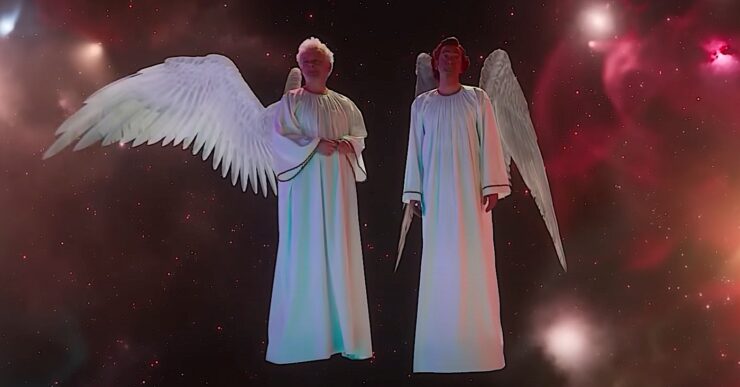Good Omens is a forked tongue stuck out at conformity and obedience to religion. While the book focuses primarily on Aziraphale and Crowley’s attempt to stop the Apocalypse because they enjoy life on Earth, both seasons of the show use some of their screentime to apply some fairly sharp elbows to the Hebrew Bible’s ribs. But season two shocked me by becoming a work of ferociously queer Midrash.
Midrash, for those who don’t know, is commentary on, and interpretation of, the Hebrew Bible. The word comes from a Hebrew verb that means “to inquire” or “seek with care”, and they’re used to interpret the ways Biblical teachings can be applied to daily life. There are two types: “midrash halacha”, about law and the practice of Judaism, and “midrash aggadah”, stories that illustrate the ethical questions asked by biblical narratives. For instance: a Third Century CE midrash on Sodom and Gomorrah makes great hay from the fact that the “outcry” of Sodom and Gomorrah—the reason God noticed the cities and decided to smite them—was referred to with the feminine form of “it”. Why were a pair of cities being referred to with a single pronoun? And why a feminine pronoun? A rabbi took that single word and spun it into a story to explain this weird word usage: a young Sodomite girl takes pity on a poor friend, and gives the friend some flour. The other Sodomites, who hate generosity, execute the girl to make an example of her. It’s her outcry that God hears, and, seeing how vile the Sodomites and Gomorrah-ites have become, God squashes most of them to make an example of them, just as they did to the girl.
Neat, right?
This story slides alongside the story from Genesis, giving another example of how hateful the people of those cities were, and justifying God’s decision to try burning it all down.
Now, an important note: I am not Jewish! (I almost became Jewish, twice, but those are stories for different days.) Thus my understanding of Judaism comes from a bit of a remove—I’ve studied Judaism, Christianity, and Roman religions in conversation with each other; I’ve studied Jewish history a bit, particularly Medieval European Jewish stuff (which is loads of fun let me tell you); I’ve studied the ways modern Judaism and Christianity inform, and are informed by, 20th- and 21st-Century U.S. culture and pop culture. This is all to say that I know a bit, but nowhere near as much as I want to, and if I get anything straight-up wrong let me know in the comments…
My other important note is that I am going to have to go on, for a bit, about the Hebrew Bible. The way Good Omens adapts these two stories is fascinating—but you can only really see the adaptations if you know the originals.
Before the Beginning

A helpful thing for more secular people to remember is that Good Omens, as a concept, is a horror to plenty of religious people. The idea that you would in any way mock, joke about, slightly tease, gently poke, or even smile at things like the Story of the Flood, The Resurrection, The Apocalypse, The Second Coming is, itself, offensive. (Me, I think it’s all fair game as long as the jokes are good, and if any all-powerful all-knowing ineffable beings want to heckle me back, they’re welcome to do so.) And the idea that you’d rewrite the story of Sodom and Gomorrah and The Book of Job entirely? Give them the endings that they should have had in the first place? Why, you can’t possibly do that! Look at all those capital letters denoting importance!
And yet here we are. I’m going to unravel the original stories and talk about how Good Omens changes them—and also how the show’s take on Job might actually be a more accurate version of the story.
And now for some Biblical context…

The events of Sodom and Gomorrah and The Book of Job are recounted in the Hebrew Bible. Sodom and Gomorrah was probably written as a way to explain why the land around the town of Zoar wasn’t fertile, and to explain the weird (and apparently wife-shaped) rock formations in the area. The basics of the story are that a pair of God’s emissaries are treated extremely badly in the city of Sodom, so God destroys it with a hail of fire and sulfur. It’s about hospitality and the responsibility a town has to its guests and immigrants, but because there’s an element of sexual violence in the story, Christian commenters began interpreting it as an injunction against homosexuality.
In Genesis 18:20, God tells Abraham that They’re planning to destroy Sodom and Gomorrah because it’s a wretched hive of scum and villainy. But Abraham makes the fascinating choice to go to bat for humanity. He challenges God, and I’m going to use the King James Version translation here because I like it:
“Wilt thou also destroy the righteous with the wicked? Peradventure there be fifty righteous within the city: wilt thou also destroy and not spare the place for the fifty righteous that are therein? That be far from thee to do after this manner, to slay the righteous with the wicked: and that the righteous should be as the wicked, that be far from thee: Shall not the Judge of all the earth do right?”
And God replies, “If I find in Sodom fifty righteous within the city, then I will spare all the place for their sakes.” But rather than stopping there, and thanking God for Their generosity, Abraham haggles. Haggles! “Behold now, I have taken upon me to speak unto the Lord, which am but dust and ashes: Peradventure there shall lack five of the fifty righteous: wilt thou destroy all the city for lack of five?” Until by the end, he’s talked God all the way down from 50 righteous people to ten. (Notice Abraham’s self-description as “dust and ashes”? Hang onto that—it’ll be important in a few paragraphs when we talk about Job.)
This whole conversation becomes pretty moot a few verses later, however.
What seems to happen next is that God’s emissaries—angels?—stop off with Abraham’s brother nephew Lot, his wife, and his daughters, who live in Sodom. Except all the men of Sodom surround the house and demand that Lot hand over the angels, and Lot, in a breathtaking example of thinking outside the box, offers his daughters to them instead, because he’d rather do that than break hospitality laws. The men reject this offer, which they make clear by trying to crush Lot to death, until the angels pull him back inside the house and blind the men outside. Then they tell Lot to flee with his wife, daughters, and future sons-in-law, but the boys think he’s kidding and refuse to leave. The angels basically have to drag Lot and his wife and daughters out, and even then, with God inches away from raining fire and sulfur down on the city, Lot looks out at the hills and balks at the idea of having to camp. He points out a nearby city “Look, that city is near enough to flee to, and it is a little one. Let me escape there—is it not a little one?—and my life will be saved!” (Which, everything else in this bit of Genesis aside, I have to respect Lot’s commitment to a walkable urban lifestyle.) The angels agree not to destroy that city, and sends them on their way with a warning not to turn back, whereupon Lot’s wife immediately looks back and is turned into a pillar of salt. (I also feel compelled to point out that an entire paragraph is given to Lot’s all-consuming panic at the idea of a rural life, while Lot’s wife’s death is given a single line of text. …and absolutely nothing fucked up happens to Lot’s family after that.)

But of course, the main thing here is that the story of Sodom and Gomorrah was used as a cudgel against queerness for the last few thousand years, because later interpreters decided that the sin the men of Sodom committed was wanting to have sex with male-coded angels, rather than what the text actually seems to be saying: not welcoming aliens into your city is bad, gang rape is bad, violence in general is bad. These men, faced with guests in their city, sinned by wanting to do non-consensual shit to them. I mentioned that Midrash above, that was written sometimes in the 300s CE. And if you want a straight-up biblical source, I give you Ezekiel 16:49: “Behold, this was the iniquity of thy sister Sodom, pride, fulness of bread, and abundance of idleness was in her and in her daughters, neither did she strengthen the hand of the poor and needy. And they were haughty, and committed abomination before me: therefore I took them away as I saw good.” [KJV, baby!] “Abomination” can mean a lot of things, not just sex—and certainly not specifically gay sex—and a lot of interpretations reject the homophobic reading entirely.
It’s also worth noticing that this story only happens after we see Abraham argue with God, who for Their part was willing to listen and be talked down from genocidal ledges.
Join Me on the Ash Heap for Job!

Job is a weird book (I mean even as books of the Hebrew Bible go) because for all the dramatic possibility implied by “God makes a bet with Satan” and “successful man loses everything and wants to fight God” and “God gets mad and comes down in a whirlwind”—most of the book is actually just Job and his friends talking. (And talking and talking…)
Job is a highly successful member of his community, but more than, he’s a deeply moral champion of the poor and helpless. He is beloved of God. But then God makes a bet with Satan (more on that in a sec) to see if losing everything will cause him to “bless” God—with “bless” here a euphemism for “curse”, because the idea of cursing God was so horrifying that the poet who wrote Job would only look at it sideways.
After the bet is in place, all the action happens off-page: Job only learns that he’s lost everything as the reader does. A series of surviving servants show up in quick succession to tell him that:
- all of his livestock are dead,
- all the camels have been stolen,
- all the other servants are dead,
- all of his kids were having dinner at their eldest brother’s house when the roof caved in and squashed them.
It kind of turns into a super dark Mel Brooks bit by the end? But what we’re left with, as readers, is page after page of Job lamenting his fate while his “friends”, Eliphaz the Temanite, Bildad the Shuhite, and Zophar the Naamathite, argue with him that he must have done something to deserve so much misfortune. At first Job simply suffers, but finally he snaps and argues with them that he’s blameless, and that what he should probably do is sue God. Once he exhausts his three peers, the son of an acquaintance shows up to take up the argument—a character named Elihu who comes in like the most annoying youth pastor ever, essentially saying: “but have you ever considered that with God, all things are possible?” as though that hasn’t already been covered for pages. (Many scholars think that Elihu might have been a later, Poochie-like addition to the text, because when God finally replies, They don’t respond to any of the points he makes. But to be fair the points are not really worth responding to.) Then, in the last pages, God shows up in whirlwind form to tell Job that he has no right to second guess his Creator, because, as a mortal, he can’t possibly understand Creation enough to critique it. (And also to talk about how fuckin’ rad the Behemoth and the Leviathan are, which, fair point.)
I’ve already written a lamentation about the Book of Job. Back when I reviewed Daredevil Season 3 I went off for a bit about Job being the go-to reference point for every single suffering character—which, well first of all, there are so many other biblical characters you could talk about! Give Job a rest! But also, that isn’t exactly the point of Job. While the characters in the book are musing on the question of Why People Suffer, the wraparound text of the book itself tells you exactly why: it’s a bet between God and one of Their employees—a fact which is never shared with Job or his family. One possible read on the book is: humans are pawns in an inscrutable universe, and think as hard as you want but you’ll never understand ineffability, puny human. Or at least that’s one interpretation. Another one, which was explored in Edward L. Greenstein’s 2019 book Job: A New Translation, is that Job’s final reply to God is not the awed repentance many people think it is. But I’ll get back to that in a second.
But this is all why I punched the air when I realized Good Omens was taking it on. Rather than focusing on the bet between God and Satan—OK, hang on. Let me define some terms first.
God, Satan, They/Thems Causing Mayhem

When I use the word “God” in this essay, I’m either referring to God as They appear in my base translation of Job, The Oxford Annotated New Revised Standard Version (I know, I know), Greenstein’s translation, or Good Omens—as I understand the canon. I’m using They pronouns for God (a) ‘cause Good Omens does, and (b) ‘cause it’s above my fucking pay grade to assign God a gender.
On to Satan! Satan, in the Book of Job, is “the adversary” or “accuser”—kind of a prosecuting attorney, and absolutely an employee of God’s, not a free agent. Not the red fiddle-playing horned devil or the three-head Dantean beast or the suave trickster or the Miltonian tragic hero or the cardboard thin MCU-style supervillain who will somehow credibly battle an all-powerful God at the End Times—those are all versions that Christianity created and made popular. Job is a story about Jews trying to make sense of the God of the Jews, and it was probably written after around 500 BCE, so we’re still at least a few hundred years before that Other Guy shows up with all his complications. The bet was much more God trying to prove a point—possibly to Themself?—or like springing a pop quiz on humanity, than it was a moral battle with an equal, because one of the points of the book is that God doesn’t really have any equals. This version of Satan is, at all times, under the power of God. Everything that happens to Job has God’s initials next to every fluorescent post-it on the document.
Back to Job!

Another point of Job, probably, is the ending—not the restoration of Job’s stuff, or the wholesale replacement of his kids, but the fact that God takes time out of Their day to talk to him. And according to Greenstein’s translation, another point is that Job doesn’t actually cave when faced with the whirlwind.
In the King James Version, Job says:
I know that thou canst do every thing, and that no thought can be withholden from thee.
Who is he that hideth counsel without knowledge? therefore have I uttered that I understood not; things too wonderful for me, which I knew not.
Hear, I beseech thee, and I will speak: I will demand of thee, and declare thou unto me.
I have heard of thee by the hearing of the ear: but now mine eye seeth thee.
Wherefore I abhor myself, and repent in dust and ashes.
And in the OAE of the New Revised Standard Version, Job says:
I know that you can do all things, and that no purpose of yours can be thwarted.
Who is this that hides counsel without knowledge?
Therefore I have uttered what I did not understand, things too wonderful for me to know.
‘Hear, and I will speak; I will question you, and you declare to me.’
I had heard of you by the hearing of the ear, but now my eye sees you;
Therefore I despise myself, and repent in dust and ashes.
In both of these translations, one from the 17th Century, and meant purely for religious use, and the other from the 1990s and meant for academics to study, it would seem that Job, faced with his Creator, is overwhelmed, realizes he’s bitten off more than he can chew, theologically speaking, and apologizes for being presumptuous.
But Greenstein’s 2019 translation of Job digs into the usages of the words “dust and ashes” and posits instead that Job is not repentant or groveling AT ALL.
I have known you are able to do all;
That you cannot be clocked from any scheme.
“Who is this hiding counsel without knowledge?”
Truly I’ve spoken without comprehending—
Wonders beyond me that I do not know.
“Hear now and I will speak!
I will ask you, and you will help me know!”
As a hearing by the ear I have heard you, And now my eye has seen you. That is why I am fed up. I take pity on ‘dust and ashes’”!
Whew.
After mocking God to Their face—not cursing, or blessing, but mocking—Job says that he pities humanity because we’re stuck with a God Who’s high on Their own drama rather than being concerned with human life. This is a far cry from repenting in “dust and ashes”. Josephine Reisman talked about it in an article over at Slate, pointing out the ways that this new interpretation makes the book very helpful to people dealing with the despair and unknowability of modern life, with its climate collapses and global pandemics. The other fun thing with this interpretation? If Job is saying “I take pity on ‘dust and ashes’”, it’s possible that the wording is a conscious callback to that conversation Abraham had with God, back in Genesis 18, right before the story of Sodom and Gomorrah, and that Job is reminding God of the earlier conversation—and Their earlier compassion. Here, possibly, we have a throughline: Job and Abraham, two mortal men (both married to deeply sarcastic women, btw), who are willing to get in God’s face when They’re being too callous with humanity.
I think we can get on to Good Omens now! (Trust me, I’m still shorter-winded than fucking Bildad.) The cool thing is that the adaptation doesn’t take the obvious route of showing us the bet that opens Job, and it sidesteps the discourse between Job and his friends, and any mediation on Job’s suffering. It rewrites the story to focus on Job’s family, and, even more interestingly I think, how the wager affects Crowley and Aziraphale. And then the penultimate episode, in solid midrash style, takes Sodom and Gomorrah as a jumping-off point to muse on the ethical questions of that story rather than the bullet points.
Good Omens as Midrashim

We meet Job, sitting and wailing in a dung heap. His friends are nowhere to be found, but Crowley impersonates Bildad the Shuhite to explain his presence and get access to the kids. We meet Job’s wife, Sitis. She is unnamed, and only given one line in the original tale of Job—we’ll get to that one line in a moment—but here she’s a full participant in the action.1 Gone is the messenger, running in to tell Job and his faithful readers about tragedies that happen off-page. Instead we actually meet his kids—three instead of ten—who are a little spoiled because they’re used to being the beloved children of God’s favorite human. We meet haughty Enon (who flirts with Aziraphale???!!!), and bratty Keziah, and adorable Jemimah (and her pot!), and we don’t want to watch Crowley kill them.
And here, in Good Omens, we get the version I’ve wanted. After God speaks to Job, he reports back to his wife. “God went into some detail about how great whales are.” Sitis asks if “They explained” what’s happening to the family, but all Job can manage is “If you want answers, come back when you can make a whale?” Sitis, though, sticks to the point: “Did They mention the children???” Because of course this is the important bit—not the pages-long discourse, or the friends’ thoughts on morality, or even that God taught the ostriches to run, cool as that is—the thing that matters is this family, suddenly buffeted by horror like they’ve stumbled into an Ari Aster movie. In marked contrast to the original version, Good Omens doesn’t let you forget that.
When Gabriel and the legion of angels tell Job and Sitis that their children are gone and not coming back, but will instead be replaced with new kids, we watch as the parents break down in agony at the loss. And, in fact, this is what causes Sitis to almost say the single most metal line in the entire Hebrew Bible (and there are many contenders): “Curse God, and die” but this time she’s not saying it to her pathetic husband, still crawling after a deity who’s forsaken him—she’s saying it to the all-powerful being who just murdered her babies and expects her to roll with that. It’s Sitis who turns on Gabriel and roars “If our children are dead then I will curse God and di-” and it’s Crowley who stops her (“That never ends well! Remember me? Bildad the Shuhite?”) to save her from Gabriel and the other angels.

The other thing that I love? The miracle that saves Job and Sitis’s children hurts. Under Crowley’s direction (“Shoemaking and obstetrics: those have always been the twin passions of Bildad the Shuhite”) Sitis pulls three of Job’s ribs out to mimic the creation of Eve, and upends that little Biblical injunction as well: This time it’s the father who suffers the pain of childbirth. Which, tbf, it’s shitty that after everything Job has gone through, he also gets some ribs yanked out, but it’s still the best option here. [author’s note: OK, I was wrong about this one, those are ox-ribs as a few commenters have pointed out. Still subverts the creation of Eve though, kind of!]
The story of Job becomes another part of the journey Aziraphale and Crowley are on. This season deepens the earlier season’s narrative of two immortal beings who enjoy life on Earth, and (ahem) enjoy each other’s company, so much that they don’t want the End Times to come just yet. When Season One stopped off in Noah’s story for a few scenes, Aziraphale toed the party line and talked about how nice the postdiluvian rainbow was going to be, while Crowley was the one who couldn’t accept that God would drown the kids, too. Now, in Season Two, we get to see that way back at the Beginning, the Unnamed Angel Who Would Become Crowley was already grousing that God hadn’t put out a Suggestion Box. By the time we get to Job, Crowley is quietly rebelling against both Heaven and Hell, a solitary mission of damage control.
What does Aziraphale do when he learns that Crowley does in fact have a permit to burn Job’s life to the ground, sparing not even the children? He goes straight to… Gabriel. (Baby steps.) Gabriel shows him that all of Job’s stuff will be restored, and Aziraphale is mollified, until he realizes that the original children will still die, and that he’s the only Ineffable Being in the room who seems to care. When Aziraphale understands that the kids are doomed, he doesn’t ask God to save them, no… he appeals to Crowley. But not until after he tries to take the high road by saying that as an angel he gets “to do what God wants”—only for Crowley to whiplash back with “like killing innocent children to win a bet with Satan.” At which point it’s the angel who blunders, adorably, into the only actual act of blasphemy in the entire episode: “I don’t think that is what God wants, and I don’t think you want it either!” he says to Crowley. The sheer revolution of that moment is lost amid Crowley blowing up, getting in Aziraphale’s face, and hissing: “What do you know about what I want? I long to destroy the blameless children of blameless Job, just as I did his blameless goats.”
But let’s stay in this moment a moment. For Aziraphale, angel of God, to speak against his Maker, to presume to know the mind of said Maker, is, well, fucking heresy. And free will in its purest form—a thing he shouldn’t be capable of, really, but Crowley seems to bring it out in him.
Naturally this enrages Crowley, who has been alone for so. Fucking. Long.
And then Aziraphale says maybe the most interesting line in the entire season: “May God forgive you.”
For… what? Enacting God’s stated will? That was written down on that enormous scroll? The scroll Aziraphale just read, in Heaven? It’s Crowley who’s actually working with that Ineffable Plan that the angel’s always going on about, and Aziraphale who is acting against it by assuming that he knows better than his Boss. And while we’re on this, isn’t Crowley already pretty definitively damned? How is God’s forgiveness going to work here? It makes no theological sense because it doesn’t need to—Aziraphale has to put his shock at Crowley’s callousness—his disbelief at Crowley’s callousness, his hope that somehow, impossibly, he and Crowley can end up on the same side again—in the context of God, because that’s the only language the angel has to tell Crowley he loves him.
But Crowley finally finds a co-conspirator for his mission. They hide out with the kids while the other demons destroy everything. Crowley transforms Jemimah into a blue newt because she wants to be a blue newt, and he nudges Aziraphale into trying human food for the first time, the first falling domino in their thousands of years of shared meals andever- growing empathy for humanity. The two also seem to be the only immortal beings who witness God’s reply to Job, and while Aziraphale is overcome with awe (still in love after all these years, how sweet) Crowley seems to be… jealous.

“…don’t suppose he’s getting any answers,” Aziraphale murmurs.
“Just to be able to ask the questions,” Crowley replies.
Crowley continues his improv as Bildad the Shuhite, and the two use the angels’ utter ignorance of humanity against them, on humanity’s behalf. Aziraphale lies to his bosses, and his Boss, for the first time, not to get himself out of trouble or in a spirit of rebellion, but simply to protect the humans from a God he can no longer trust. He sides with the “dust and ashes” rather than his immortal coworkers—he and the Job of Greenstein’s translation seem to have something in common. Because Aziraphale lied, he thinks he’s being taken to Hell; he’s thought that ever since he gave his word as an angel, and did it anyway. But Crowley won’t take him to Hell, because he doesn’t think Aziraphale would like it. (If only God had given a moment’s thought to what Job might or might not like when They made that wager with the Satan.) Here we have a mirror with Job—at least, in Greenstein’s interpretation. Like Job, the angel learns to take God with at least a small pillar of salt. He realizes that he, too, is on the side of the dust and the ashes far more than he is on the side of the angels. (But for all that, when actually faced with God, he’s still besotted… hello cliffhanger ending of Season 2.) Exeunt Job, pursued by a whale.
***
Now, to move on to things that Aziraphale does like. “The Ball” is a lot of things. It’s the penultimate episode, it’s where Shax’s demon army comes to earth to try to storm the bookshop, it’s where Crowley returns to Heaven for the first time in thousands of years because that’s how much he loves Aziraphale (sob), it’s where the humans finally seem to realize that Mr. Fell and his gothy partner are a little…weird.
That moment centuries earlier, when Crowley talked him into try some roast beast, was the first domino falling until we land here, at a business meeting turned party, where an angel hosts his human neighbors and feeds everyone. The Ball itself is an explosion of queerness, gender fluidity, high camp, chandeliers—within the walls of Mr. AZ Fell’s bookshop, everyone is welcome, safe, fed. Allowed to dance or not, allowed to express joy in whatever way they want.
What the Ball becomes, really, is a story of a queer couple throwing a Jane Austen-inspired ball for their friends instead of a stuffy business meeting. The magic shop owner doesn’t want to come because it’s his anniversary; Aziraphale tells him to bring the partner along; the partner uses they pronouns (just like God!); people dance together in all sorts of different configurations, all of them beautiful; the show finally gets Hamm in a stunning suit so he can serve hors d’oeuvres, thus the angel joyfully serves the humans and becomes part of Aziraphale’s hospitality circle; the entire party has been orchestrated to try to get Maggie and Nina to fall in love with each other (they like each other, and there’s clearly a spark there, but neither of them have any interest in being pushed into a barely-consensual rebound situation, even if ineffability is involved).
But again, it’s more than that. It’s a spell, a miracle, a magical work of protection for Gabriel.

And it’s another fun spin on Sodom and Gomorrah: a naked male-coded angel shows up at a bookstore with no memory, knowing only that this bookstore feels like a safe haven. The angel who runs the bookshop brings him in, and promises to protect him—despite the fact that these two celestial beings have a pretty bad history. A few days later a terrifying crowd throngs around the shop, demanding that the angel be turned over to them. But the bookstore owner who promised him hospitality holds to his word, and defends him from all comers, until the angel recovers his memory and is able to escape to a new life with his beloved.
The hot male-coded angel, made resplendent in a high camp outfit, is also a person on the run. He is defying all of Creation for love. The hordes of Hell gather outside the shop, and, just as in Genesis 19, demand that he be handed over for torture. And Aziraphale could hand him over. He could use Gabriel as a bargaining chip to secure his own safety, or Crowley’s. He could remind himself that Gabriel tried to destroy him, not so long ago. But, as he says to Gabriel, “You came to me. I said I would protect you. And I will.” And so, he and the two queer women create a shield between the angel and the demons outside, while another demon leads all the beautiful ballgoers to safety.
This is hospitality law brought to its fullest understanding: all are welcome, all are safe. The mortal women won’t be thrown to the horde any more than the angel; the queer partygoers are just as important as the demon who leads them to safety. The demon horde would be welcome to join, too, if they’d just chill out a little. The Heavenly Host could have some canapes. But barring that, Aziraphale will protect his guests even if he has to battle the entire order of the universe to do it.

***
As I understand it, the point with Midrash is to take the theme and explore it, not the facts. Hence Gabriel and Beelzebub’s genders don’t matter here—they’re angels and demons, so that matters even less than with humans, where it matters very little. The point is that their love is forbidden, it’s an abomination to both Heaven and Hell. As Sodom and Gomorrah was interpreted for years as a comment on queer love (it almost certainly wasn’t) the midrash here is to take a different type of “forbidden” love and put it in jeopardy. What can be forbidden in a universe where queerness is a non-issue in the eyes of Heaven? And in a universe where everyone seems to have accepted Crowley and Aziraphale, and their Whole Deal, as part and parcel of their quiet rebellion against the cosmos? The impossible love between the angel-i-est angel and a truly demonic demon stands in for queer love quite handily. And it allows the midrash to be a commentary on a commentary—it’s poking at the bad readings of Sodom and Gomorrah that have plagued humanity for centuries, not even really on the original text itself.
In the book of Good Omens, Crowley “saunters vaguely downwards” and Aziraphale doesn’t want to spend eternity listening to Elgar and Liszt (which, they’re both great, but you’d want more variety than that for, um, forever.) The adaptation deepens that story.

Crowley didn’t go along with Hell because he was easily swayed or lazy or liked his car or any of that—he always “did want to go his own way. Always asking damn fool questions too”, per the Metatron. He thought God should give everyone a Suggestion Box long before Satan cooked up his little rebellion. Aziaphale isn’t defying heaven because of his own appetites, as much as he has come to love his books and music and food and wine and afternoons at the Ritz—and rightly so. As far back as the Flood, he disagrees with Heaven’ lack of empathy for creation. And by the time of Job, with some nudging from Crowley, he begins to act on that empathy. Even his defection back to Heaven comes from him wanting to fix the place, not bring humanity in line with Divine Bureaucracy. And Crowley can’t go along with it because he knows it was broken from the outset—again, not the world, the world isn’t broken—it’s Heaven’s top-down managerial style that sucks.
In a lot of theological conceptions of the universe, God and Satan are locked in battle for human souls. Or the devil is locked in a battle he thinks he can win, not realizing that god will vanquish him in the end. Or the universe is unfolding according to a capital-P Plan, and people fates are written in the Book of Life as each autumn approaches, to unfold over the next year. But Good Omens is proposing a much more interactive cosmology, where humans get to actually use their free will, they’re responsible for their own fates, Heaven and Hell are running on fumes, anyone with any real creativity or emotional truth gets out and doesn’t leave a forwarding address, and God? God seems to be leaving the universe on read, for reasons that can probably be put down to ineffability.
But maybe we’ll find out in season 3, if we get one. I really want to see what they do with the Second Coming.
This piece was written during the 2023 WGA and SAG-AFTRA strikes. Without the labor of the writers and actors currently on strike, the series being covered here wouldn’t exist.
[1]And this being Neil Gaiman, of course the name is significant. In the apocryphal Testament of Job, which was probably written sometime between the 1st centuries BCE and CE, she’s called Sitidos, she stands by Job through his trial, but dies before the whole “new batch of kids” thing, and he has a second family with Dinah, the daughter of Leah and Jacob.















Job didn’t get his ribs pulled out! Those were the ox ribs Aziraphale polished off in his first-meal frenzy. The whole business was sleight-of-hand. Aziraphale passed Sitis the ribs and Crowley placed Jemima’s pot with the lizard-children in it among Job’s robes, Sitis went through the motions of pulling the ribs out of Job’s sides (because Gabriel saw Eve made that way and thinks it’s normal childbirth), and Aziraphale took Crowley’s transformation miracle off the the children so that they appeared to come from the ribs.
I’m using They pronouns for God (a) ‘cause Good Omens does, and (b) ‘cause it’s above my fucking pay grade to assign God a gender.
Good Omens the book uses “He” for God throughout. Prologue, Crowley says “Makes you wonder what He’s really planning”. Chapter 1, “God does not play dice with the universe; He plays an ineffable game of His own devising”.
Thank you so much for this fascinating interpretation! I must have watched the new season 15 times by now, but there’s ALWAYS been more to find–and this was a terrific addition to my appreciation. At the beginning I was baffled by you connecting The Ball to Sodom and Gommorah, by the end I was completely convinced–just a terrific essay, thank you so much.
Also
@2 cool detail with those being ox ribs from earlier…but whatever they did sure seemed to make Job uncomfortable, and he was too confused to fake it, so can’t have been purely sleight-of-hand
@3 The novel uses he/him for God, Season 1 of the tv show uses she/her, and the most recent season seems to have settled on they/them.
It would be great if something claiming to describe a midrash actually used passages from Jewish-produced translations of the books in question, instead of Christian versions (which in many cases don’t say anything at all like the same things).
The ribs that Sitis pulls from Job’s cloak, are ox-ribs that Aziraphale planted there mere seconds before.
I loved this analysis! Thank you! I have always found the book of Job fascinating and beautiful. Checked out the new translation you mentioned at the library yesterday and I’m excited to dig into it!
I caught the pillar of salt reference when Crowley is escorting the humans out, but hadn’t connected the hospitality to strangers bit of the story to them protecting Gabriel. So good!
@2: I reckon this is where Aziraphale’s fondness for stage magic began!
@@.-@: To be fair, it is probably uncomfortable and confusing to abruptly have three ox ribs shoved inside your robe. Also, God is both She/Her and They/Them in S1! The latter is less obvious, though: in the Flood scene, Crowley says, “But They’re killing everyone else?” but it’s ambiguous whether he means They as in God, or they as in Heaven (but I’m pretty sure Neil said it’s meant as the former).
Ox ribs – in my headcanon I see Aziraphale as actually inserting the ox ribs into Job’s body at some point so that Gabriel can see them emerging from his body as he saw Adam’s rib emerging from Adam.
” (b) ‘cause it’s above my fucking pay grade to assign God a gender.’ – probably the best line I’ve read this year and certainly meme and quote worthy.
” Abraham’s brother Lot, his wife, and his daughters …” Lot was Abraham’s nephew, not his brother.
Ooh, thanks for connecting the dots on the ball as a subversion of the Sodom & Gomorrah story. I like this midrash.
@@@@@12: You are absolutely right, I don’t know how I messed that up. I, um, blame the tiny type, or something. I fixed it in the post, thanks for the catch!
@@@@@ almost everybody: Y’all are right about the ox-ribs, that was just my terrible eyesight. I added a note, and by all means imagine me doing the “I was wrong” dance.
And while we’re on this, isn’t Crowley already pretty definitively damned? How is God’s forgiveness going to work here?
Crowley isn’t human and therefore can’t be damned! (Or, for that matter, saved.)
It would be great if something claiming to describe a midrash actually used passages from Jewish-produced translations of the books in question, instead of Christian versions (which in many cases don’t say anything at all like the same things).
Can you explain what the errors are here and maybe recommend a correct version? That would be really helpful.
In a lot of theological conceptions of the universe, God and Satan are locked in battle for human souls. Or the devil is locked in a battle he thinks he can win, not realizing that god will vanquish him in the end. Or the universe is unfolding according to a capital-P Plan, and people fates are written in the Book of Life as each autumn approaches, to unfold over the next year
That last one is what Crowley realises is the true state of affairs at the end of the book.
“Why make people inquisitive and then put some forbidden fruit where they can see it with a big neon finger flashing on and off saying THIS IS IT?… Maybe it’s all part of a great big ineffable plan. All of it. You, me, him [Adam], everything. Some great big test to see if what you’ve built all works properly? It can’t be a great cosmic game of chess, it has to be just very complicated solitaire…”
And in the same conversation, he says that maybe the really big one will be all of Us against all of Them. Heaven and hell, versus humanity.
Maybe that’s them trailing the never-written sequel…